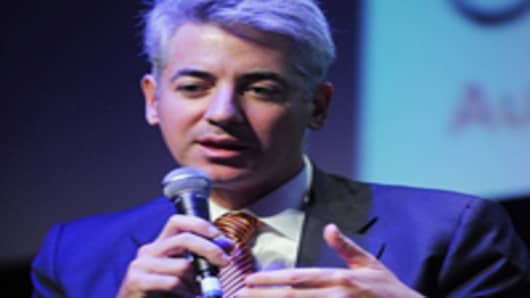Bill Ackman can always be relied on to provide a little excitement in investing circles. His lunchtime presentation at CNBC and Institutional Investor’s Delivering Alpha conference today will be no exception. The founder and CEO of hedgefund Pershing Square Capital Management will unveil his latest investing idea.
Whether they fail or flourish, Ackman’s investments are always bold, and he touts them with an enthusiasm that has gained him a reputation as the archetypal optimist. But even his most profitable investments have tested his mettle.
His 2002 short positionon bond insurer MBIA led to probes of his firm by then NY Attorney General Elliot Spitzer and the SEC. In the end, Ackman was exonerated, and MBIA became the subject of investigation thanks to Ackman’s shareholder activism. Ackman made $1 billion on the MBIA investment, yielding a 22 percent return to shareholders.
Another notable win, his investment in McDonald’s in 2005, almost doubled by the time he sold it for $56 a share a couple of years later. But along the way, management rejected two of his plans to reorganize the company that included ideas on how to unlock the value of its real estate and franchise network.
Not all of Ackman’s investments have taken years to pay off. He made $300 million on his 11 percent stake in Fortune Brands in 2010. Ackman has added to the position since.
Ackman’s biggest success to date has been his investment in mall operator General Growth Prop, a real estate investment trust he bought into five months before it went bankrupt. Pershing made $1.6 billion on the investment, 30 times what it paid for General Growth.
But some of his losses have been no less spectacular, like his investment in retailer Target . In April 2009 Ackman launched a campaign to put his own slate of directors on the board, reorganize the company to take advantage of its real estate holdings and sell its credit card business. The plan was rejected at a shareholder meeting in Waukesha, Wisconsin, despite a tearful speech in which Ackman quoted John F. Kennedy.
Ackman lost about 90 percent or $1.8 billion on the Target investment in 2009. In his letter to shareholders that year, Ackman characterized the investment in Target as “one of the greatest disappointments of my career to date.”
Another Ackman disaster was his investment in Borders, which lost 99 percent of its value when the company declared bankruptcy. While Ackman’s stake was much smaller than his stake in Target, the degree of the loss was just as dramatic.
Another instance where Ackman limited his losses by keeping the stake small was his purchase of AIG in 2008. He kept the investment to 2.5 percent of the portfolio because of AIG’s leverage, according to that year’s shareholder letter. Ackman acknowledged a moderate loss on the position, after a failed attempt to get stakeholders to agree to a restructuring plan of Pershing’s design.
Despite his prudence in the case of AIG, Ackman is known for concentrating risk in a handful of investments. Of the $6.4 billion portfolio Pershing Square boasted at the end of June, five investments accounted for about 84 percent of the value, according to a filing with the SEC.
Later Wednesday, we’ll hear about his latest new position. Whether it turns out to be a winner or a loser, it’s guaranteed to be fun to watch.
Pershing Square Largest Holdings (June 30, 2011):
JC Penney 21 percent
General Growth Prop 19 percent
Fortune Brands 17 percent
Citi 15 percent
Kraft 12 percent


